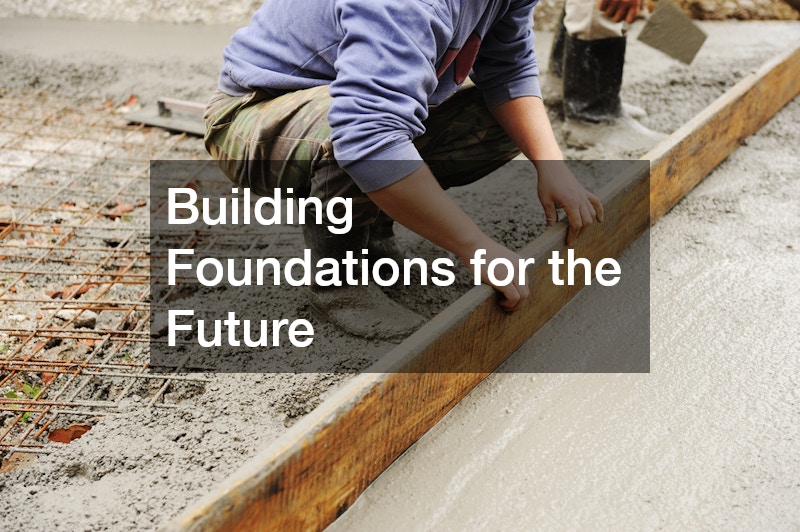Across the country, businesses of every size and type are rethinking how they serve their communities. From local service providers to large-scale developers, the modern approach to business goes beyond profits—it’s about purpose, impact, and sustainability.
Today’s forward-thinking companies are investing in ways that strengthen neighborhoods, support families, and promote healthier, more connected lives. Whether it’s creating safe spaces for children, offering essential care services, or improving the built environment, these efforts show that businesses truly have the power to make a difference.
Here are 10 ways modern businesses are building stronger communities, one project and one partnership at a time.
1. Building Foundations for the Future

Every thriving community begins with a strong foundation—literally and figuratively. Companies involved in new home construction play a key role in shaping neighborhoods where people can live, grow, and connect. Modern builders are reimagining what it means to create a home, blending sustainability, technology, and thoughtful design to meet the evolving needs of families and future generations.
Eco-conscious practices are now central to the construction process. Builders are integrating renewable materials, advanced insulation systems, and energy-efficient windows to reduce environmental impact and lower long-term utility costs for homeowners. Smart-home technology is another defining trend, allowing residents to monitor energy use, enhance security, and increase convenience with the tap of a smartphone.
Beyond materials and technology, today’s construction leaders understand the importance of creating spaces that encourage community. Many developments now include parks, walking paths, and communal gathering areas that promote social interaction and healthy lifestyles. By collaborating with local suppliers and contractors, construction companies also stimulate regional economies and create jobs, reinforcing their role as community builders.
In essence, these businesses are doing more than constructing buildings—they’re helping to shape the social and environmental fabric of entire neighborhoods. Through innovation and collaboration, they’re laying the groundwork for communities that are not only sustainable but also deeply connected and resilient.
2. Supporting Working Families Through Reliable Care
In today’s fast-paced world, reliable childcare is more than a convenience—it’s a necessity for maintaining a balanced and productive community. Daycare centers play a vital role in supporting working families by providing safe, structured, and nurturing environments where children can learn and grow. These centers allow parents to focus on their professional responsibilities with peace of mind, knowing their children are receiving quality care and attention.
Modern daycare facilities are evolving to meet the changing needs of families. Many now offer flexible scheduling options, extended hours, and specialized programs that encourage creativity, physical activity, and early academic development. Enhanced safety protocols, from secure entry systems to trained staff in first aid and child development, ensure that children are cared for in a protected and engaging space.
Businesses are also recognizing the value of accessible childcare. Partnerships between employers and daycare providers are becoming increasingly common, offering benefits such as subsidized care or even on-site childcare centers. These collaborations help reduce employee stress, improve job satisfaction, and promote retention—creating a win-win situation for families and businesses alike.
By investing in high-quality childcare solutions, communities empower parents to contribute fully to the workforce while giving children a strong foundation for lifelong learning. Reliable daycare is more than a service—it’s a cornerstone of thriving families and resilient communities.
3. Elevating Education and Opportunity
Education continues to be one of the most powerful tools for building stronger, more resilient communities. Today’s private schools are redefining what it means to prepare students for the future—focusing not just on academics but also on developing well-rounded individuals who contribute meaningfully to society.
Modern private institutions are expanding their missions beyond traditional curricula. Many now integrate programs in emotional intelligence, leadership development, and community service, teaching students to balance knowledge with compassion and civic responsibility. This holistic approach equips young learners with the interpersonal and problem-solving skills needed to navigate an increasingly complex and connected world.
Collaboration between private schools and local businesses is also becoming more common. Internships, mentorships, and community-based projects help students apply classroom concepts in real-world contexts. These partnerships foster innovation and give students valuable exposure to local industries while strengthening ties between education and the broader community.
Smaller class sizes remain a hallmark of private education, allowing for personalized attention and tailored learning experiences. At the same time, many schools are expanding access through scholarships, financial aid, and outreach initiatives—ensuring that educational excellence isn’t limited by income or background.
By embracing inclusivity, innovation, and service, private schools are cultivating the next generation of leaders who will help their communities grow with empathy, awareness, and purpose.
4. Giving Young Learners a Strong Start

Early childhood development plays a crucial role in shaping lifelong success. Modern preschools recognize this by combining play-based learning with structured educational programs designed to build foundational skills.
Today’s preschools emphasize inclusivity, creativity, and holistic growth—focusing not just on literacy and numeracy but also on social and emotional development. Many incorporate outdoor learning, cultural activities, and family engagement to strengthen bonds between parents, teachers, and the community.
By creating nurturing environments where young children can thrive, preschools help parents balance work and family life while ensuring the next generation grows up confident and curious. Their role in the community extends beyond education—they’re helping to shape a brighter, more supportive future for all.
5. Powering Local Economies Through Logistics
Every strong community relies on the steady flow of goods, materials, and resources—and warehouse facilities are at the center of that movement. These spaces form the foundation of local and regional supply chains, ensuring that businesses, from small retailers to major manufacturers, can operate efficiently and meet growing customer demands.
Modern warehouses are no longer just storage spaces; they’re becoming smart, sustainable hubs of innovation. Many are adopting automation technologies like robotic pickers, digital inventory systems, and real-time tracking software to increase accuracy and speed. At the same time, energy-efficient lighting, motion sensors, and green building materials are reducing environmental impact while lowering operating costs.
Sustainability has also become a defining feature of the logistics industry. Some warehouses are now powered by renewable energy sources such as solar panels or wind systems, while others incorporate green roofing or water recycling solutions. These upgrades not only cut emissions but also serve as examples of how industrial development can align with environmental stewardship.
Beyond technology, warehouse facilities contribute directly to local economic stability by creating diverse job opportunities—from logistics management to equipment maintenance. Many also collaborate with local transport providers, packaging suppliers, and retail outlets, forming interconnected networks that stimulate community growth.
By combining innovation with sustainability, modern warehouse operations showcase how logistics can do more than move products—they can power local economies and strengthen communities from the ground up.
6. Fostering Confidence and Connection
Personal care businesses have long been integral to community life, and today’s hair salons are redefining what it means to serve their neighborhoods. These spaces are more than just places for a haircut or a color refresh—they’ve become hubs of connection, creativity, and confidence. Salons often act as safe spaces where clients can unwind, share stories, and leave feeling rejuvenated both physically and emotionally.
Modern salons are embracing a more holistic approach to beauty and wellness. Many are incorporating eco-friendly and cruelty-free products, reducing waste through refill programs, and sourcing materials from local suppliers. These sustainable practices not only minimize environmental impact but also reflect a broader commitment to ethical business values.
Beyond their role in personal grooming, salons contribute significantly to local economies by offering apprenticeships, job opportunities, and mentorship programs for aspiring stylists. This investment in skill development fosters entrepreneurship and creates pathways for professional growth within the community.
Many hair salons are also stepping up as community advocates—hosting charity fundraisers, organizing workshops on self-care and mental wellness, and supporting initiatives that uplift marginalized groups. By merging artistry with compassion, today’s stylists are doing more than transforming appearances—they’re building relationships, inspiring confidence, and cultivating a sense of belonging that strengthens the social fabric of every neighborhood they serve.
7. Caring for Every Creature
Communities flourish when compassion extends to all living beings—and that includes the pets that bring warmth and joy to countless households. A modern animal hospital plays a crucial role in ensuring the health and happiness of these beloved companions. By keeping pets healthy, veterinary professionals indirectly nurture the wellbeing of families and the emotional harmony of neighborhoods.
Today’s animal hospitals are evolving beyond traditional care. They offer advanced treatments such as laser therapy, minimally invasive surgeries, and tailored nutrition plans designed to improve longevity and quality of life. Telemedicine consultations are becoming increasingly popular, allowing pet owners to access professional guidance without leaving their homes—especially useful for elderly owners or those in remote areas.
Beyond medical care, many clinics engage with the community through outreach and education. They partner with local schools, shelters, and rescue groups to promote animal welfare, host vaccination drives, and encourage responsible pet ownership. These collaborations not only save lives but also build a stronger sense of shared responsibility and empathy.
Veterinarians and their teams are often the unsung heroes of community wellbeing, offering comfort during difficult moments and celebrating recovery alongside families. Through innovation, compassion, and education, modern animal hospitals demonstrate that caring for pets isn’t just about medicine—it’s about strengthening the emotional bonds that make communities more connected, resilient, and humane.
8. Promoting Health and Balance
A thriving community depends not only on infrastructure and opportunity but also on the health and happiness of its people. Modern wellness centers have emerged as vital spaces that nurture both body and mind, combining fitness, nutrition, and holistic therapies to help individuals achieve lasting wellbeing. These centers focus on prevention as much as recovery, empowering residents to lead healthier, more balanced lives.
Wellness hubs now offer an integrated approach to care—bringing together fitness trainers, dietitians, therapists, and healthcare professionals under one roof. From yoga and pilates classes to mindfulness workshops and nutritional counseling, each program is designed to support physical strength, emotional stability, and mental clarity. Many centers also include spa and relaxation services, providing a sanctuary for stress relief in an often fast-paced world.
Community collaboration is at the heart of these initiatives. Local health experts, schools, and businesses frequently partner with wellness centers to host health fairs, group fitness events, or educational seminars on topics like mental health awareness and preventive care. These efforts promote inclusivity, ensuring that wellness is not a luxury but a shared community priority.
Ultimately, wellness centers do more than improve individual health—they foster collective vitality. By encouraging residents to prioritize self-care and build supportive habits, these spaces contribute to stronger, happier, and more resilient communities where wellbeing becomes a shared foundation for growth.
9. Prioritizing Oral Health and Confidence
Healthy smiles are about more than appearance—they’re key to overall wellness. A modern dental office combines advanced technology with patient-centered care to deliver better experiences and outcomes.
Digital X-rays, same-day crowns, and preventive screenings make dental visits faster and more comfortable. Many dental practices now focus on education, teaching patients about long-term oral hygiene and how it connects to systemic health.
Beyond clinical care, dental professionals often support local outreach programs, offering free check-ups or education sessions in schools and senior centers. These efforts show that dentistry plays an essential role in both individual confidence and community wellbeing.
10. Keeping Our Roads—and Lives—Running Smoothly
Reliable transportation keeps every community moving, and auto shops ensure that happens safely. Today’s repair and maintenance businesses are evolving with advanced diagnostics, electric vehicle support, and eco-friendly disposal of automotive materials.
Many local shops pride themselves on honest service, transparent pricing, and community involvement. They sponsor local events, provide apprenticeship programs, and help residents keep their vehicles efficient and road-safe.
Auto repair businesses are also embracing sustainability—using recycled oils, energy-efficient lighting, and proper waste disposal to reduce their environmental footprint. Their work goes beyond mechanics—it’s about keeping people connected, ensuring mobility, and contributing to a cleaner, more responsible future.
Conclusion
Modern businesses are no longer just participants in the economy—they are active builders of better communities. From housing and education to health, sustainability, and everyday services, these industries show that progress doesn’t have to come at the expense of people or the planet.
By prioritizing care, innovation, and responsibility, today’s organizations are redefining what it means to do business well. Whether it’s through smarter construction, compassionate services, or sustainable operations, every effort contributes to a stronger, more resilient world—one that benefits everyone it touches.


